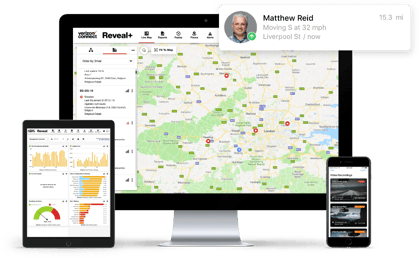9 Secrets to Reducing your Fleet Expenses
As a fleet owner, your day-to-day costs can quickly add up. What you don’t know is there are further hidden, expensive...
Read more
Like many industries, freight and haulage have faced a difficult 2020. Managing the logistics of multiple shipments across disparate locations is not easy at the best of times. Against the backdrop of closed borders and varying restrictions from country to country, that task is all the more challenging.
At the peak of lockdown restrictions, heavy commercial traffic fell to around 30% of normal levels, taking months to recover to its peak. This level of business interruption has, of course, placed a greater focus on margins and profitability.
Freight companies are increasingly looking to control costs, get more from their resources and drive greater efficiency into every mile. In many cases, GPS fleet tracking technology can help.
As any fleet manager or freight business owner will know, there is no magic wand when it comes to reducing running costs. With maintenance essential and fuel prices ever-fluctuating, much of the cost of running a fleet is outside our control.
With the right tools, however, you can take steps to get a handle on your outgoings. The first is to focus on waste. Behaviours that seem relatively inconsequential, such as detouring a few miles a day or idling for a few seconds per stop, can soon add up across your fleet.
With a GPS solution at your disposal, you can work to reduce these behaviours. By tracking instances of idling, for example, you can create friendly competition between drivers to incentivise them to form new habits.
A fleet management solution can also help to cut down on unnecessary mileage. The latest smart algorithms can calculate each day’s drops in an efficient order, taking into account information on load and vehicle type, as well as road closures and congestion. When implemented across a fleet, this method can reduce mileage by up to 10% in some cases.
Improving fleet safety may also help to control costs.
Almost half of the HGVs on Britain’s road network exceed the speed limit on 30mph roads, with 36% doing the same on National Speed Limit roads. On top of this, speed is known to be a factor in 21% of accidents involving HGVs.
Incidents like these can carry a direct cost, in the form of fines and repair bills, along with a number of more indirect costs such as rising insurance premiums and extended vehicle downtime.
With a fleet management solution in place, you can monitor instances of unsafe driving, including speeding, harsh cornering and hard braking. This data can then be used to create driver scorecards to rank each member of your team. The safer the driver, the higher the rank. Top performers can be rewarded with those lower down incentivised to improved.
Increasing efficiency is often less about cost-cutting and more about getting more from the resources you have at your disposal. Once again, GPS fleet management technology can help to achieve this aim.
Route planning algorithms not only help to reduce fleet mileage, they may also help to free up resources to complete more jobs in the working day, potentially increasing efficiency and profitability.
Automation can also unblock your time which you may then use to serve more customers. Freight companies generate all sorts of paperwork, be it invoices, job tickets, or timesheets. With a fleet management solution, much of this admin could be done digitally and automatically – helping to increase accuracy as well as efficiency.
Fleet tracking technology can also help you get more from your tachograph. Integrate your tacho in your solution and you’ll be able to view live driver status, schedule tachograph files to download remotely, and receive alerts when breaks are imminent and warnings when driving hours are exceeded.
Finally, with an asset tracking solution as part of your fleet management system, you can track the usage of your powered and even your non-powered assets. With this information readily accessible, you can spot underused or underperforming vehicles and equipment, helping to reduce inefficiency.
Fleet management technology has the potential to help the freight industry work safely and more efficiently. And businesses like yours are already realising this potential.
If you’d prefer to see our tools in action, book a free demo today.
Tags: All




Find out how our platform gives you the visibility you need to get more done.
As a fleet owner, your day-to-day costs can quickly add up. What you don’t know is there are further hidden, expensive...
Read moreVerizon Connect Reveal tracks the fleet data that can have a big impact on your business. These are things like where...
Read moreAt Verizon Connect, we can only provide the highest possible level of service to fleet managers and business owners by...
Read moreReveal tracks the fleet data that can have a big impact on your business. These are things like where your vehicles are...
Read more